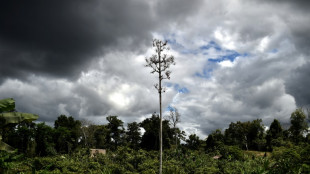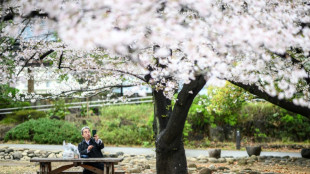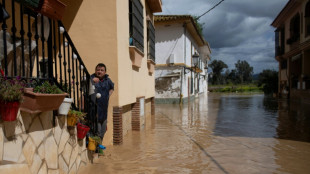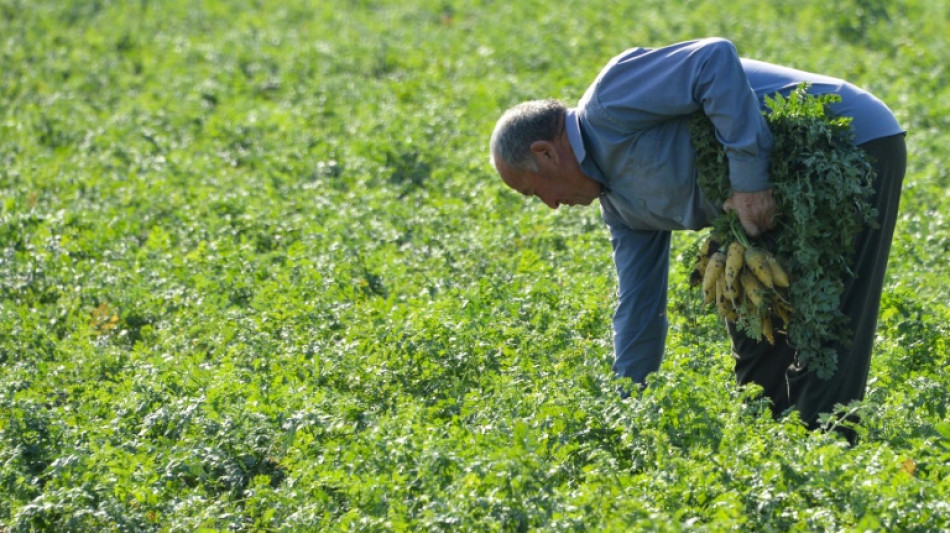
-
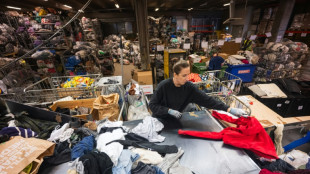 Sweden drowns in discarded fast fashion items
Sweden drowns in discarded fast fashion items
-
Rybakina powers Kazakhstan into Billie Jean King Cup finals

-
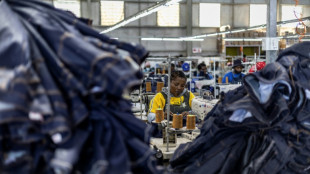 Despite US tariffs pause, southern African economies under threat
Despite US tariffs pause, southern African economies under threat
-
A night at the Geneva opera -- that is a literal snoozefest

-
 Cash-strapped Nigerians turn to YouTube for entertainment
Cash-strapped Nigerians turn to YouTube for entertainment
-
Two dead as fans, police clash before Copa Libertadores game in Chile

-
 Flowers in their hair: Shan boys ordained into Buddhist monkhood
Flowers in their hair: Shan boys ordained into Buddhist monkhood
-
Edwards leads Wolves past Grizzlies as playoff race heats up

-
 Ancelotti questioned as Real Madrid face Alaves
Ancelotti questioned as Real Madrid face Alaves
-
Old foes Bayern and Dortmund face off amid spectre of European exit

-
 Early holiday, more fans: Philippines schools adapt to climate change
Early holiday, more fans: Philippines schools adapt to climate change
-
In skies, as on land, European forces face gaps if US pulls back
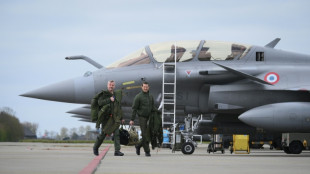
-
 Digital divas: Can Japan's virtual YouTuber craze crack America?
Digital divas: Can Japan's virtual YouTuber craze crack America?
-
WHO pandemic agreement talks face deadline crunch

-
 Stocks, dollar sink and gold hits record as Trump tariff panic returns
Stocks, dollar sink and gold hits record as Trump tariff panic returns
-
LeMond hails 'one in a million' Pogacar ahead of Paris-Roubaix debut

-
 Liverpool can move closer to the title as top five tension mounts
Liverpool can move closer to the title as top five tension mounts
-
Trump admits trade war 'cost' as markets hit

-
 AI only just beginning to revolutionize the NBA game
AI only just beginning to revolutionize the NBA game
-
Despite Trump pause, overall US tariff rate at highest in a century

-
 'A pain that doesn't subside' at funerals for Dominican nightclub disaster victims
'A pain that doesn't subside' at funerals for Dominican nightclub disaster victims
-
Panama deal allows US to deploy troops to canal

-
 US firm says it brought back extinct dire wolves
US firm says it brought back extinct dire wolves
-
Grieving Dominicans start burying 220 victims of nightclub disaster

-
 Aberg closes strong at 'sneaky hard' Augusta National
Aberg closes strong at 'sneaky hard' Augusta National
-
US auto union praises some Trump tariffs

-
 Australian IVF clinic admits embryo mix-up
Australian IVF clinic admits embryo mix-up
-
Rose: I've played well enough to win Masters but lack the jacket

-
 Rose again enjoys 'luxury' of first-round Masters lead
Rose again enjoys 'luxury' of first-round Masters lead
-
Rose rockets to Masters lead, defending champ Scheffler in pursuit

-
 Tesla opens first showroom in oil-rich Saudi
Tesla opens first showroom in oil-rich Saudi
-
Oscars to add new award for stunts

-
 Hatton loves being at Masters but 'It's just so hard'
Hatton loves being at Masters but 'It's just so hard'
-
'Mistakes can happen': Amorim backs Onana after Lyon nightmare

-
 RFK Jr says study will reveal cause of autism 'epidemic'
RFK Jr says study will reveal cause of autism 'epidemic'
-
Tourist family, pilot killed in 'tragic' NY helicopter crash

-
 No.1 Scheffler makes strong Masters start to defend title
No.1 Scheffler makes strong Masters start to defend title
-
Man Utd and Spurs draw in Europa League, Rangers hold Athletic

-
 Rose rockets to Masters lead with Scheffler and McIlroy in pursuit
Rose rockets to Masters lead with Scheffler and McIlroy in pursuit
-
Man Utd held late in Lyon after Onana errors in Europa League

-
 Man Utd held late in Lyon after Onana errors
Man Utd held late in Lyon after Onana errors
-
Wall Street rally fizzles as tariff fears resurface

-
 MLS to open 'second phase' of major season overhaul study
MLS to open 'second phase' of major season overhaul study
-
Argentina braves 24-hour strike as it awaits word on IMF loan

-
 Spain's Ballester finds relief in Masters water hazard
Spain's Ballester finds relief in Masters water hazard
-
Porro rescues Postecoglou as Spurs held by Frankfurt

-
 Grieving Dominicans start burying 200+ victims of nightclub disaster
Grieving Dominicans start burying 200+ victims of nightclub disaster
-
CONMEBOL proposes one-off 64-team World Cup in 2030

-
 Rybakina on form for Kazakhstan in BJK Cup
Rybakina on form for Kazakhstan in BJK Cup
-
Former Real Madrid coach Leo Beenhakker dies aged 82


Crops under threat as surprise March heatwave hits Central Asia: study
A surprise heatwave hit Central Asia in March, a new study published Friday showed, putting in danger crops and water supply in a largely rural region already heavily affected by the impacts of climate change.
Temperatures across the month were up to 10 degrees Celsius (50 degrees Fahrenheit) hotter in the region than the pre-industrial average, according to World Weather Attribution, a coalition of scientists that studies the impact of climate change on extreme weather events, which conducted the research.
Climate change intensified the heatwave by about 4 degrees Celsius, the group said, though cautioned that figure "is likely an underestimate."
"This is a heatwave that didn't make headlines –- it happened in spring and in a region that isn't exactly known for blistering heatwaves," said Maja Vahlberg, a technical adviser at the Red Cross Red Crescent Climate Centre who took part in the study.
The research was conducted across the five Central Asian states of Kazakhstan, Kyrgyzstan, Tajikistan, Turkmenistan and Uzbekistan.
"Our heatwave studies often detect changes of 2 to 4 degrees Celsius (35-39 degrees Fahrenheit), so 10 degree Celsius is quite frankly bonkers," said Ben Clarke from Imperial College London.
"Hotter March temperatures are impacting agriculture harvests and access to water in Central Asia, as well as people's health," said Friederike Otto, co-head of World Weather Attribution.
The melting of thousands of glaciers is a major threat to people in the landlocked region, which already suffers from water shortages.
Between 14 and 30 percent of glaciers in the Tian-Shan and Pamir -- the two main mountain ranges in Central Asia -- have melted over the last 60 years, according to a report by the Eurasian Development Bank.
The heatwave coincides with a crucial agricultural season, when almonds, apricots and cherries bloom and wheat is sowed.
Around half of all workers in Tajikistan and Uzbekistan are employed in agriculture, which makes up one-fifth of the region's economy.
In particularly hot spots, temperatures hit 30 degrees Celsius -- highly unusual for March.
Central Asia is typically characterised by exceptionally hot summers and harsh, cold winters.
Climate scientists said early heatwaves in the region would likely continue, seeing it as a trend rather than a one-off event.
"We should expect events like this often," Clarke told AFP during an online briefing.
O.Schlaepfer--VB

